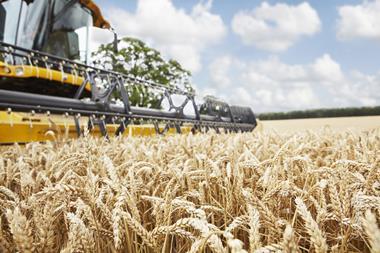This year’s harvest has been referred to as the “worst for a generation” as unfavourable weather earlier this year has hit the yield and quality of UK wheat.
Alex Waugh, director general at the National Association of British and Irish Millers, said that quality looked to be down across the UK, as the wheat harvest is in its final stages.
He told British Baker: “The amount of wheat that meets the full specification for bread-making wheat will be small... it will be in single figures.” Putting aside price, he said the main problem was with specific weights – essentially the amount of flour you get from the crop.
“Early tests have showed they were the lowest they have been for 30-40 years. The implications are that the milling process is harder, millers need to use more wheat to produce the same amount of flour, and that the quality of the flour is not as good,” explained Waugh. “It’s a significant problem. On top of that, there are still assessments going on – on the baking characteristics of the wheat. It looks poorer than previous years, but the question is how poor is it?”
On a positive note he said that although imports are likely to be up, mainland Europe has seen a much better harvest, so the availability should be there.
Paul Matthews, joint managing director at miller FWP Matthews, said the current assessment of Group 1 milling wheat, within a 50- to 60-mile radius of his mill in Chipping Norton, has revealed that, of the wheat available to him, only 3.3% meets the full specification of bread making wheat – 76kg per hectare litre (kg/hl), a Hagberg Falling Number (HFN) of 250 and 13% protein.
He said if you go down to a lower spec, “which below these criteria, I would normally reject”, of 74kg/hl, 225 HFN, and 12.5% protein, there is still only 12% of the wheat available to him and his area, that meets it.
Matthews said he would normally expect to see 75-80% of the wheat, available to him, meet the full specification.
“On top of this, in regards to quality, we have problems with mycotoxin, and potential dough functionality issues.” He also warned that we may not have seen the last of the flour price rises, from millers. “It’s going to be a very tricky year. The message about how bad the situation is needs to get to the retailers, otherwise there will be casualties.”
Gary Sharkey, head of wheat procurement at Rank Hovis, confirmed it had found that yields were down. “Rather than the 16 million tonnes (m/t) we were expecting, it looks to be more like 14m/t; and there are issues with quality.”
However, Lewis Wright, trading director, ADM Milling, said it could be closer to 13m/t. He told British Baker: “The harvest has been causing problems for all sectors of the supply chain. Indifferent yields and quality are leading to logistical problems and wheat performance and functionality is being assessed closely in a season that looks set to be very different from the 2011 harvest.
He continued: “We have seen more yield variances this season than recent years, and low specific weights across all grades of wheat have been the recurrent theme so far. This variability of the crop has made it difficult to estimate accurately whether UK production is closer to 13mt or 14mt. For comparison, the UK produced 15.3mt of wheat in 2011.
“A production figure below 13.5mt would start to raise concerns over the UK supply and demand balance and could see the level of imports for this season rise sharply as millers look for alternative sources of supply to supplement the UK quality wheat shortfall.”
In terms of price, Wright said that with so little of the crop unlikely to meet full specification this season, it
it is unlikely these will fall significantly from their current high levels. “Biscuit wheat premiums have also widened as merchants continue to struggle to collate quality information nationwide from the protracted completion of the harvest,” he said. “Future price direction remains unclear until production figures are finalised, but supply and demand in the UK is looking more finely balanced than in previous seasons.”
Rank Hovis said UK wheat prices have been driven higher, due to the lateness of harvest and the impact of poor weather across the summer on new crop wheat quality. “The 2012 UK wheat harvest has certainly been challenging in terms of timing and grain quality. The UK wheat harvest has reduced by circa 2m/t year-on-year with 2012 estimated at 14m/t,” said the miller.
“Wheat availability and significantly reduced white flour extraction levels have been the key issues resulting from the combination of delayed harvesting and subsequent low grain density (as measured by hectolitre weight).” The firm added that protein levels were very similar year-on-year, however there had been a slight reduction in the amount of functional protein within the grain, while Hagberg Falling Numbers had reduced – “but for baker’s grades not to a level to cause concern”.
“Bakery processing and final product quality of UK-based flour is largely similar to the 2011 crop,” said Rank Hovis, adding that it had identified that, for certain processes, there was a need to review improver formulations to achieve optimal performance and final product quality.
































No comments yet